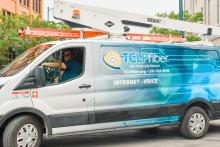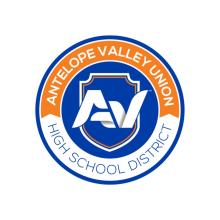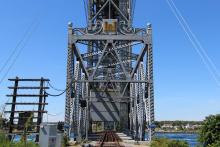
Both the Sagamore Bridge and Railroad Bridge that span opposite ends of the Cape Cod Canal carry the kind of traffic that terrifies Comcast and Verizon.
The 576 count fiber-optic strand strung across the Railroad Bridge in Buzzards Bay – and the 864 strand that crosses the Sagamore Bridge – belongs to OpenCape, an open-access “middle mile” network ushering the gold-standard of Internet connectivity into parts of each of the Cape’s 15 towns.
It’s an extension of OpenCape’s fiber network, lashed to utility poles in dozens of communities across southeastern Massachusetts, all of which connect the region to the nation’s Internet backbone/long haul network.
Middle mile networks are a key part of the Internet’s connective tissue that dramatically lowers the cost for Internet service providers (ISPs) to deploy “last mile” connections to individual homes and businesses.
Thanks to a federal grant courtesy of the American Recovery and ReInvestment Act, the nonprofit fiber network was established in 2009 and since then has been providing Internet connectivity to most of the region’s anchor institutions – hospitals, public safety facilities, numerous libraries, schools, banks, and dozens of other enterprise clients with big data needs such as the Marine Biological Laboratory and the Woods Hole Oceanographic Institution in Falmouth.
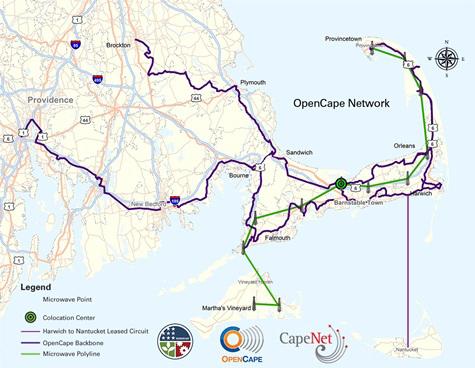
Over the past several years OpenCape has deployed fiber deeper into the region, expanding the network from an initial 350 miles to 650 miles of fiber today, serving a growing number of Main Street businesses across the Cape.
Downtown Falmouth and Woods Hole Main Streets’ were the first on the Cape to get fiber service. Then, over the summer, OpenCape further expanded its network into the neighboring town of Bourne onto Buzzards Bay’s Main Street, offering local businesses there 10 gig service. Most recently, thanks to a Community Block Grant from the Town of Barnstable, local businesses along Main Street in Hyannis will get access to the same kind of fiber connectivity that has become increasingly important for small businesses to more efficiently operate and reliably access global markets.
Community-Owned Broadband Networks An Existential Threat to Monopoly Providers
The very thought of OpenCape’s fiber backbone growing to support “last mile” Internet service for every home and business on the Cape – something that could be done with a capital infusion of about $300 million – scares the living daylights out of the region’s duopoly ISPs. The reason why is simple: in terms of speed, bandwidth, and reliability, fiber runs circles around the aging cable network and antiquated DSL lines Cape Codders have long relied on for Internet service.
That’s not a gratuitous knock against the incumbent ISPs. It’s physics and the inherent properties of wired technologies. There isn’t a network engineer worth their salt who would dispute that fiber has been – and will continue to be for the foreseeable future – the King of Internet connectivity because it’s the fastest and most reliable way to transmit near limitless amounts of Internet traffic. The only real questions with fiber networks are the financial and political considerations: are the upfront capital costs required to build-out a fiber network worth it, and how will the monopoly incumbents react?
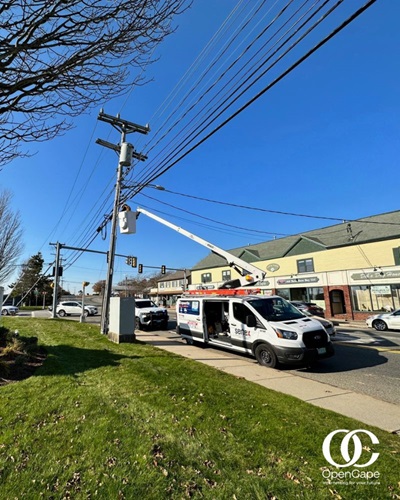
“After we finished turning up the XGS 10 Gig PON in Buzzards Bay, the very next day both Verizon and Comcast were on the street with their trucks running fiber,” OpenCape CEO Steve Johnston tells ILSR.
Johnston says although OpenCape is primarily a middle-mile network that does not (yet) have the capital to become a full-blown fiber-to-the-home (FTTH) network, even the specter of limited “last mile” fiber service provides a glimpse of what competition can do in a market long characterized by a lack of choice. It incentivizes the incumbents to make network upgrades – something they have refused to do for decades.
“For us, winning is about bringing choice and competition,” he says. “So we are Comcast’s and Verizon’s worst nightmare, and we are just getting started.”
While OpenCape may be nudging the regional giants to offer better service here and there, the closer local communities get to building out community-wide fiber networks that don’t rely on the incumbent providers, it sets the stage for Machiavellian politics to play out.
In true free markets, choice among ISPs benefits all Internet users as each ISP competes on price and service. But in reality, monopoly providers would rather they didn’t have any competition. Hence, wherever and whenever a community gets serious about building fiber networks themselves (via municipal broadband or in partnership with an independent, community-minded ISP), dark money smear campaigns seemingly pop up out of nowhere.
The goal of these campaigns is to persuade local officials and residents that municipal broadband and other types of community-owned networks are a “waste of taxpayer dollars.” Of course, it’s subterfuge to disguise the true motive: crush potential competition in its infancy.
Falmouth In The Crosshairs
Recently, the town of Falmouth became the target of one of these astroturf campaigns as the town inches closer to either building a municipal fiber network (FalmouthNet) or partnering with an independent ISP to give residents and local businesses a real choice for Internet service.

Weary of paying among the highest prices in the state for spotty Internet service, last year Town Meeting voted to establish a Municipal Light Plant (MLP), which paved the way for Falmouth to create a municipal telecommunication utility. An engineering and design study has already been completed and now the Falmouth MLP board is seeking to hire a project manager.
Should the town secure financing for the construction of a municipal fiber network, as dozens of towns have successfully accomplished in the Berkshires, it would provide locals with a choice in providers and the cascading benefits that follow when ISPs compete on price and service. You don’t have to be an economist to understand that when a company is the only ball-game in town, selling something everyone needs, there’s little (if any) incentive to invest in network upgrades, offer competitive prices, improve customer service, or even extend their networks into economically unattractive areas.
In recent weeks, a non-profit “citizens group” that calls itself Mass Priorities has emerged out of the shadows to cast doubt on Falmouth’s municipal broadband proposal. The hope of this "citizens group" is that local officials and town voters won’t notice that there are over 900 communities across the nation that are served by municipal broadband systems that almost always offer faster, more reliable and affordable service than what is offered by the big incumbents.
Community networks also tend not to have monthly data caps or charge hidden fees.
Yet, as the Falmouth Enterprise reports, “Mass Priorities has begun a series of advertisements that urge town governments on Cape Cod to invest in bridges and water utilities, and not government-owned networks. The launch is part of a $500,000 statewide media push over the next three months.”
“On the Cape,” the group is quoted, “we need to invest our limited dollars on bridges, wastewater treatment, and other vital infrastructure projects, not waste dollars on costly and unneeded government-owned internet networks.”
Newsflash: broadband networks (fiber networks specifically) are vital infrastructure. That’s precisely why the bipartisan infrastructure law allocates $42.5 billion to build new modern networks in all 50 states and U.S. territories, prioritizing the construction of fiber networks for the reasons stated above. Spurred by the pandemic, the broadband infrastructure law is an acknowledgment that universal access to high-quality Internet service is nearly as important as electricity or clean water; a necessity for anyone to fully and meaningfully participate in an Internet-connected world – whether it’s to access government services; boost economic development; expand employment opportunities and entrepreneurial activity; facilitate distance learning; enable smart home and public safety functions; or reap the tremendous healthcare cost-savings and life-enhancing applications of telehealth.
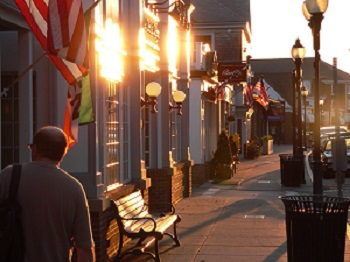
That’s the vision for Falmouth, Falmouth MLP board member Courtney Bird tells ILSR. He says that while the campaign against their efforts is far off the mark, it’s not all that surprising, especially considering the recent news that Comcast is on the verge of hiking prices even higher.
“We are further along in the process than any other municipality on the Cape and therefore the nearest to creating a viable alternative to Comcast and Verizon DSL,” he says.
And while Bird doesn’t know exactly who is funding the campaign, it’s easy to see the fingerprints of the duopoly all over it.
“$500,000 to stop our initiative? Wow! Perhaps if they had spent that money upgrading their networks and stopped overcharging for unreliable service, we wouldn’t be as far down the road to creating a viable alternative.”
On the one hand, Bird says, the campaign is revealing, describing it a “misleading, factually incorrect broadside by an industry that is scared of real competition.” On the other hand, he says “obviously they are taking us seriously. Personally, I take it as a compliment.”
Dark Money Campaigns Across The Nation
As Bird notes, while it’s difficult to track the source of these dark money campaigns, the preponderance of evidence points to the usual suspects, as is the case wherever these assaults-on-competition surface.
In Maine, just as state leaders made community broadband a key part of the state’s plan to bridge the digital divide there, along comes “Maine Civic Action,” which as Maine Public Radio reported, was tied to Charter Spectrum, the dominant monopoly provider in the region.
When Maine Public Radio reached out to the company for comment, Charter's regional spokeswoman Lara Pritchard acknowledged “the company had provided funding to the Maine Policy Institute, the Portland-based conservative advocacy group that created Maine Civic Action.”
Maine was also targeted by another industry front group that has surfaced across New England and elsewhere. They go by the name the “Alliance for Quality Broadband” (AQB), formed to warn taxpayers of municipal broadband “failures.”
While these campaigns have torpedoed municipal broadband proposals in some Maine communities, there are elected officials in the state serving small, conservative, rural communities who see through the fog of misinformation, agreeing that “public funds should support publicly owned fiber-optic networks.”
In Ohio, AQB launched a similar campaign and, unbelievably, held up FairlawnGig as an example of a “failure.” Owned and operated by Fairlawn, Ohio, the city opted to build a municipal fiber network after years of begging the local monopoly provider to upgrade its network because the city was having difficulty attracting new businesses while existing businesses said they would leave town if the Internet infrastructure there wasn’t vastly improved.
Fairlawn decided to finance the construction of a fiber network without any state or federal grants. Instead, they went to the municipal bond market. The network is now operating in the black with a 68% take-rate, largely because when an ISP offers superior service and more reliable connectivity for a competitive price, the decision is a no-brainer for broadband-hungry local residents.
Last year, while news headlines screamed about soaring inflation concerns, FairlawnGig announced it was slashing prices and boosting speeds for all of its subscribers. If offering symmetrical gig speed fiber service for $55/month is “failing,” many Falmouth residents would love to see Comcast “fail” like that instead of offering a fraction of the speed and reliability they are charging for its cable service at a price point two to three times higher than what Fairlawn residents pay.
Over the summer, Bountiful, Utah beat back a municipal broadband smear campaign backed by a “citizens group” known as “Gather Utah.” That campaign was launched just as the city prepared to build an open-access network in partnership with UTOPIA Fiber. But the “Gather Utah” petition to stop the project fell short, prompting the City Manager Gary Hill to proclaim: “hired signature gatherers ultimately failed to collect enough signatures from registered voters to advance the opposition campaign.”
Community Broadband Proponents Strike Back
The most prominent voice sounding the alarm over these dark money campaigns has been American Association for Public Broadband (AAPB) Executive Director Gigi Sohn, whose nomination to the FCC by President Biden was sabotaged by the Big Cable lobby after a vicious Senate confirmation process that stretched out for 16 months.
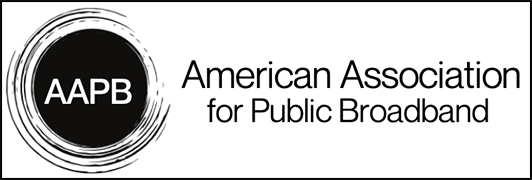
Last week, AAPB issued another alert on its website, informing its members of the link between the “Mass Priorities” campaign in Falmouth and the organization known as the Domestic Policy Caucus (DPC), an organization that purports to “educate voters on the issues that will have the greatest impact on their community.”
Though the DPC says its mission is to “support transparent, public conversations on critical policy issues," AAPB notes how DPC “launched a project titled Nogovinternet.com, with a website and series of ads attacking, among others, UTOPIA Fiber and Traverse City (MI) Light & Power, both of which run community broadband networks.”
“In addition, the DPC launched a project titled ‘Mass Priorities,’ where, among other things, it attacks a planned community broadband network for Falmouth, Massachusetts. Neither the Domestic Policy Caucus, NogovInternet.com nor Mass Priorities list any source of financial support for these projects.”
“It is profoundly ironic that the country’s richest media companies are attacking (so-called) ‘government-run’ networks when they are at the same time bringing in billions of dollars of subsidies from the federal government and seeking billions more in grants from state governments. When your tax dollars are on the table, these private enterprises are more than happy to grab them with both hands,” Sohn said.
Sohn said the creative bottom-up approach to bring better broadband to communities like Falmouth, Traverse City, and Bountiful, Utah actually tells an inspiring story, offering examples of local communities exercising “the freedom to control their broadband futures because incumbent cable and telephone companies have not built networks that meet the needs of their residents, in some cases even after city officials asked them to do so.”
“The residents of those communities want affordable, robust and reliable broadband and excellent customer service. But big cable would rather spend millions of dollars trying to block competition than improving their own networks.”
Falmouth resident and founding FalmouthNet member David Isenberg further elaborates on what the dark money campaign obscures in an op-ed published here.
In more ways than one, supporters of Falmouth's fiber network initiative are hoping residents see the bigger picture so they can finally say: the gig is up.
You can listen to CBN Director Christopher Mitchell and CBN Associate Director for Communications discuss the misleading information put out by the Alliance for Quality Broadband on Episode 514 of the Community Broadband Bits podcast below:
*Full disclosure: Community Broadband Networks Initiative Associate Director for Communications Sean Gonsalves is a volunteer member of OpenCape’s board of directors
Header image of Cape Cod Railroad Bridge courtesy of Flickr user cmh2315fl, Attribution-NonCommercial 2.0 Generic
Inline image of Falmouth Main St courtesy of Flickr user Martina Oefelein, Attribution-NonCommercial-ShareAlike 2.0 Generic.
Inline image of FairlawnGig van in driveway courtesy of FairlawnGig
Inline images courtesy of OpenCape






